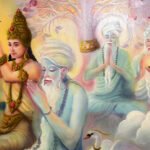As a Bodhisatta destined for Enlightenment, it took our great sage eons of time to fulfill the pre-requisites needed to become a fully-enlightened Buddha. The Blessed One gave a full account of the past actions that helped him become such a majestic and amazing being in the Lakkhaṇa Sutta of the Dīgha Nikāya–The Long Discourses. When we examine this sutta it becomes evident that the Buddha came to be as a result of his own meritorious deeds done in past lives. In this article we shall discuss four of his verbal actions.
The Buddha said that, in his past lives as a Bodhisatta, he spoke the truth and abided by it, spoke reliable words, never lied, never deceived anyone, revealed things as they really were–he was a person who consistently spoke reliable words. Because of this reason when he became the Buddha, his disciples are aligned according to his will. i.e. they abide by the teachings of the Blessed One. What does this really mean? If we want our subordinates to follow our footsteps then we need to have a merit under our belt and that would be: “not to have lied in our past lives. And if we want to see others obey our orders then this is the merit to be practiced: refraining from telling lies and telling the truth.
Further, the great sage said that in his past lives, he didn’t divide others, break relationships, or didn’t act in a way that would lead to quarrels. The Blessed One said that he didn’t use divisive speech. Instead of breaking relationships he used words that would reunite those who were divided; he spoke words that foster harmony. He put an end to quarrels among people and rejoiced with the united, delighted in creating concord. Because of this reason, when he attained Buddhahood, his disciples became strong, firm in faith, and united; they march forward helping each other. Remarkable it is, even nowadays, the secret behind us being united as followers of Lord Buddha lies in the fact that our great teacher, the Supreme Buddha, practiced the quality of refraining from divisive speech.
The Buddha said that during his long journey in saṃsāra as a Bodhisatta, he didn’t scold people, didn’t use words that would lead to a fight, didn’t use words that hurt others, didn’t agitate others and didn’t pressure them. Instead of harsh speech he spoke pleasant, soft and kind words when addressing people. Because of this kamma that he performed he received a beautiful voice just as the voice of Brahmā; and not only that but, as a Buddha his word becomes well-received by many people.
The fourth quality that the Buddha had practiced is refraining from idle chatter. His way of speaking was never loose. He avoided all unbeneficial words and instead spoke words useful to many. Because of this particular merit that he did it is said in the Lakkhaṇa Sutta that he cannot be defeated by any ascetic or brahmin, deva, Māra, or Brahmā, or anyone in the world. This means the Lord Buddha stands imperturbable, victorious–just like the leader of gods. Especially on Poya days lay-followers should avoid subjects of idle chatter, namely: talk about rulers, thieves, ministers of parliament, armed forces, dangers, wars, food, drink, clothing, beds and chairs, flowers and garlands, perfumes, relatives, vehicles, villages, towns, cities, countries, women, men, heroes, streets, rambling chitchat, departed ones, the world, the sea, and idle chatter that continues thus: ” Do you know? This is how it happened and this is how it didn’t happen.”
In the Cunda Sutta (Aṅguttara Nikāya, Book of Tens) the Buddha defines four unwholesome kinds of speech. These definitions help us better understand them and practice to correct our speech.
“Here, someone speaks falsehood. If he is summoned to a council, to an assembly, to his relatives’ presence, to his guild, or to the court, and questioned as a witness thus: ‘So, good man, tell what you know,’ then, not knowing, he says, ‘I know,’ or knowing, he says, ‘I do not know’; not seeing, he says, ‘I see,’ or seeing, he says, ‘I do not see.’ Thus he consciously speaks falsehood for his own ends, or for another’s ends, or for some trifling worldly end.
“He speaks divisively. Having heard something here, he repeats it elsewhere in order to divide [those people] from these; or having heard something elsewhere, he repeats it to these people in order to divide [them] from those. Thus he is one who divides those who are united, a creator of divisions, one who enjoys factions, rejoices in factions, delights in factions, a speaker of words that create factions. He speaks harsh words. If a word can be called harsh, coarse, thorn-like, flames anger and destroys the peace of the mind, he speaks such words.
“He speaks harshly. He utters such words as are rough, hard, hurtful to others, offensive to others, bordering on anger, unconducive to concentration.
“He indulges in idle chatter. He speaks at an improper time, speaks falsely, speaks what is unbeneficial, speaks contrary to the Dhamma and the discipline; at an improper time he speaks such words as are worthless, unreasonable, rambling, and unbeneficial.”
The four wholesome kinds of speech are defined in the same sutta as follows.
“Here, someone, having abandoned false speech, abstains from false speech. If he is summoned to a council, to an assembly, to his relatives’ presence, to his guild, or to the court, and questioned as a witness thus: ‘So, good man, tell what you know,’ then, not knowing, he says, ‘I do not know,’ or knowing, he says, ‘I know’; not seeing, he says, ‘I do not see,’ or seeing, he says, ‘I see.’ Thus he does not consciously speak falsehood for his own ends, or for another’s ends, or for some trifling worldly end.
“Having abandoned divisive speech, he abstains from divisive speech. Having heard something here, he does not repeat it elsewhere in order to divide [those people] from these; or having heard something elsewhere, he does not repeat it to these people in order to divide [them] from those. Thus he is one who reunites those who are divided, a promoter of unity, who enjoys concord, rejoices in concord, delights in concord, a speaker of words that promote concord.
“Having abandoned harsh speech, he abstains from harsh speech. He speaks such words as are gentle, pleasing to the ear, and lovable, as go to the heart, are courteous, desired by many, and agreeable to many.
“Having abandoned idle chatter, he abstains from idle chatter. He speaks at a proper time, speaks truth, speaks what is beneficial, speaks on the Dhamma and the discipline; at a proper time he speaks such words as are worth recording, reasonable, succinct, and beneficial.”
There is another noteworthy point in the Lakkhaṇa Sutta: each time when describing his previous meritorious deeds the Buddha said that by performing merit he was born in heaven. There are false beliefs that have been spreading here in Sri Lanka for a long time: that is, (1) when we do merit saṃsāra becomes prolonged; (2) we should be born again as humans to do merit, and (3) a rebirth in heaven is not prudent. But, please do ask yourself this question: “Would he, the Bodhisatta, who traveled in the long journey of saṃsāra doing meritorious deeds, longing to shorten saṃsāra, intentionally lengthen his journey by doing merit?” Of course not! The Buddha said in the Metta Sutta of the Aṅguttara Nikāya: ‘‘Mā, bhikkhave, puññānaṃ bhāyittha.” Monks, do not be afraid of merit. “Sukhassetaṃ, bhikkhave, adhivacanaṃ yadidaṃ puññānaṃ.” Merit is another word for happiness.
By refraining from the four types of unwholesome speech described above, and by practicing their opposites instead, i.e. the four kinds of wholesome speech, we are able to collect merit conducive to happiness here and now and happiness in the next life. Nibbana is of course the foremost happiness one can achieve, our final aim in practicing the Buddha’s teachings, and it is to that which we should aspire when doing meritorious deeds.
By a Venerable Thero of Mahamevnawa Buddhist Monastery












Recent Comments